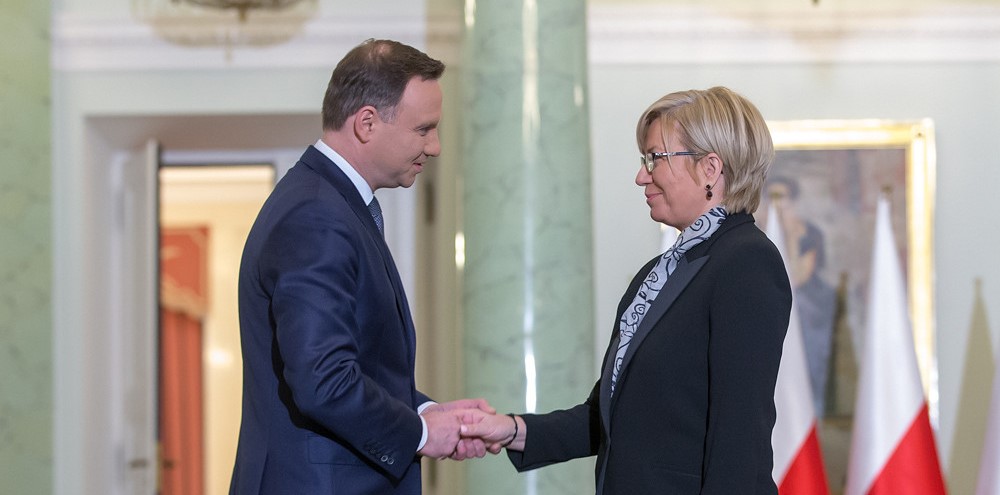Why does the Polish president’s judicial reform law constitutional referral matter so much?

By Aleks Szczerbiak
An amended judicial reform law was supposed to unblock Poland’s EU coronavirus recovery funds and help the right-wing ruling party regain the political initiative ahead of autumn’s crucial parliamentary poll.
But a presidential referral for review has put the law’s fate in the hands of a fragmented and deeply divided constitutional tribunal, virtually ending any realistic prospect of Warsaw receiving the funds before the election.
The ongoing coronavirus funds dispute
The Polish government, led by the right-wing Law and Justice (PiS) party, has been in a long-running dispute with the EU political establishment over so-called “rule-of-law” issues since it came to office in autumn 2015, particularly its judicial reforms.
The EU institutions agreed with Poland’s legal establishment and most opposition parties that these reforms undermined judicial independence and threatened the constitutional separation of powers.
Poland records EU’s largest rule-of-law decline in new ranking by @TheWJP https://t.co/dBsSKOgH49
— Notes from Poland 🇵🇱 (@notesfrompoland) October 14, 2021
PiS’s supporters, on the other hand, argued that the reforms were justified because, following Poland’s flawed transition to democracy in 1989, the judiciary, like many key institutions, was expropriated by an extremely well-entrenched, and often deeply corrupt, post-communist elite.
It accused the EU institutions of bias and double standards, acting illegitimately beyond their legal competencies, and using the “rule-of-law” issue as a pretext to victimise PiS because the party rejected the EU’s liberal-left consensus on moral-cultural issues.
As part of this dispute, the European Commission blocked the release of Poland’s €35 billion share of the EU’s coronavirus post-pandemic recovery funds until PiS implemented a July 2021 EU Court of Justice ruling that it disband a newly created Supreme Court disciplinary chamber for judges.
Warsaw felt that it had satisfied this condition when, last July, the Polish parliament adopted a law proposed by PiS-backed President Andrzej Duda replacing the disputed body with a new, apparently more impartial, professional responsibility chamber. However, the commission said that did not go far enough in meeting its rule-of-law “milestones” for un-freezing the funds, while Warsaw accused Brussels of moving the goalposts.
A recent law reforming Poland’s disciplinary system for judges – designed to resolve a rule-of-law dispute with Brussels and unlock billions in frozen EU funds – does not meet all of the @EU_Commission’s requirements, says its president, @vonderleyen https://t.co/JCr0bHDfLz
— Notes from Poland 🇵🇱 (@notesfrompoland) July 4, 2022
One of the main points of contention was that the commission insisted that Polish judges should have the right to challenge their colleagues’ status or decisions without being subject to disciplinary action.
The key issue at stake here was whether they could be disciplined for questioning the legitimacy of judges appointed by the newly constituted national judicial council (KRS), an important body that oversees the appointment and supervision of the Polish judiciary.
The council was overhauled by PiS so that elected politicians rather than the legal profession had the decisive influence in choosing its members, and the government’s critics argued that this meant it was under too much political influence.
PiS, on the other hand, argued that making judges and their supervisory organs more accountable to elected bodies was both justified, because the Polish judicial elite had operated as a “state within a state” incapable of reforming itself, and in line with practices in other established Western democracies.
The body responsible for nominating judges in Poland no longer matches the institution enshrined in the constitution due to changes made by the government, which increased political influence over the body, the Supreme Court has found https://t.co/yPNMG4u8st
— Notes from Poland 🇵🇱 (@notesfrompoland) June 2, 2022
Although PiS originally pledged not to engage in further negotiations with the commission, last September it changed tack and indicated a willingness to be more flexible.
The party’s leadership became increasingly nervous that if Poland failed to secure the recovery funds the country’s economic situation and credibility with the financial markets would worsen, public investment plans dry up and higher interest rates for government debt make state borrowing even more costly.
It was also concerned that the dispute was creating uncertainty about the fate of the much larger €76.5 billion of cohesion funding due to Poland from the 2021-2027 EU budget.
Moreover, in spite of PiS’s attempts to portray its domestic political opponents as working in collusion with Brussels on this issue, most Poles appeared to blame the governing camp rather than the commission or opposition for the potential loss of EU funds. PiS was particularly concerned that the freezing of these funds would become one of the opposition’s main attack lines in the upcoming autumn parliamentary election.
Support for the government of Prime Minister Morawiecki has fallen to its lowest ever level of 26%, finds state pollster CBOS.
Two further surveys show that most Poles blame the government – rather than the EU – for the freezing of Poland’s European funds https://t.co/9qtplsCYJt
— Notes from Poland 🇵🇱 (@notesfrompoland) October 26, 2022
Duda’s bombshell
As a consequence, last December the government announced a compromise agreement with the commission which, PiS hoped, would unblock the recovery funds if the Polish parliament approved a law further amending the judicial reforms.
A key provision was transferring the disciplinary procedure for judges from the professional responsibility chamber, which the commission still considered too politicised, to Poland’s Supreme Administrative Court (NSA), a separate entity from the Supreme Court viewed as more independent because its staffing and functioning had not yet been questioned by any EU bodies.
While opposition parties and some Polish legal experts argued that such a move was unconstitutional, the government was adamant about its legality.
Moreover, in a much more significant retreat for PiS, the legislation also extended the scope of the so-called “test of judicial independence and impartiality” of judges. This was a new procedure established by Duda’s Supreme Court amendment law giving affected parties the ability to request that a court examine objections to a particular judge in their case, but which did not guarantee other judges the right to challenge the status of their colleagues.
The Polish ruling party’s new judicial bill is “unconstitutional on many levels”, says the Supreme Court’s spokesman.
Many legal experts and judges have voiced doubts about the constitutionality of the law, which is intended to unblock frozen EU funds https://t.co/fjXiIhl3s1
— Notes from Poland 🇵🇱 (@notesfrompoland) January 16, 2023
The new legislation would allow for the test to be initiated by the court itself, as well as ending disciplinary procedures against judges for formally questioning their colleagues’ status.
Last month, the Polish parliament passed the new law and, at one point, the recovery funds appeared to be within the government’s grasp. However, PiS’s plan received a major, unexpected setback when Duda referred the legislation to the Constitutional Tribunal (TK) for so-called “preventive control”, which means that it will not come into force until the tribunal rules on its constitutionality.
Duda had previously voiced misgivings about several aspects of the new legislation even before it was submitted to parliament. He was particularly concerned about the proposed changes to the system for testing judicial independence and impartiality which, by potentially questioning the legality of the president’s appointments, challenged his constitutional prerogative to nominate judges.
Nonetheless, PiS was hoping, and most commentators expecting, that Duda would either simply approve the legislation or allow it to come into force while referring the clauses about which he had misgivings for constitutional review.
For more on the judicial bill – which the government says will unblock frozen EU funds but which both the opposition and part of the ruling coalition claim is unconstitutional – see our report from yesterday https://t.co/mxWLyc6LNX
— Notes from Poland 🇵🇱 (@notesfrompoland) February 10, 2023
A fragmented and conflicted tribunal
Government critics argue that the TK is under the influence of PiS which, they say, has turned it into a tool for rubber-stamping controversial government laws, something which the ruling party’s supporters deny or argue that its politicisation predates the current administration.
However, in recent weeks the tribunal has found itself embroiled in an internal dispute between supporters and opponents of its current president, Julia Przyłębska.
At least six tribunal members argue that Przyłębska’s term of office as president expired last December and so the tribunal cannot review the judicial reform law until a successor is appointed. Przyłębska denies this and has received support from the government, arguing that she remains in office until 2024, when her term as a tribunal member ends, as the law specifying a six-year presidential term came into effect after her appointment.
The head of the constitutional court has resisted an attempt by a group of judges to replace her.
However, given that the group no longer recognises her as chief justice, there are doubts over the functioning of the court as it assesses a key judicial law https://t.co/QoScU2YiUc
— Notes from Poland 🇵🇱 (@notesfrompoland) March 2, 2023
But whereas other disputes within Poland’s judiciary have generally been between “new” judges appointed since PiS introduced its reforms and “old” ones nominated under previous governments, the six justices calling for Przyłębska to leave are all post-2015 nominees.
They are considered to be close to justice minister Zbigniew Ziobro who introduced many of the government’s most controversial reforms and leads the right-wing conservative United Poland (Solidarna Polska) party, PiS’s junior coalition partner which voted against the amended judicial reform law in parliament.
The problem is that at least 11 out of the tribunal’s 15 members must be present for a quorum to make a judgement on this issue, so it is highly uncertain when it will be able to review the law. In other words, the constitutionality of one of the most important laws in the current parliament will be determined by a fragmented and conflicted body in the midst of a deep internal crisis.
In fact, the Polish opposition and legal establishment do not recognise the TK as a lawfully established body in its current form, arguing that three of its members were not appointed properly and questioning the legal validity of Przyłębska’s original election as president in December 2016 (again, PiS vigorously denies this).
Poland’s constitutional court cannot adjudicate lawfully because it contains improperly appointed judges who “infect it with unlawfulness”, the country’s top administrative court has found in the latest ruling against the government’s judicial policies https://t.co/kN1h0BQGcB
— Notes from Poland 🇵🇱 (@notesfrompoland) December 6, 2022
Moreover, last month the situation was further complicated when the European Commission also expressed serious doubts about the tribunal’s independence and impartiality, and launched further EU Court proceedings charging it with undermining the EU’s legal order.
These charges date back to two TK rulings issued in July and October 2021 that found parts of the EU treaties to be incompatible with – and, therefore, legally subordinate to – the Polish constitution.
However, even if Brussels chooses to treat this issue separately from the judicial disciplinary system dispute, the EU Court could still “freeze” the tribunal as an interim measure. The commission could then use this as a pretext to argue that the “milestones” have not been fulfilled and further delay recovery fund payments even if the tribunal rules that the judicial reform law is constitutional.
The @EU_Commission has launched further legal action against Poland.
It says that two rulings by Poland’s constitutional court – which found parts of EU law to be inconsistent with the Polish constitution – „violated and challenged the primacy of EU law” https://t.co/DShAPKOBla
— Notes from Poland 🇵🇱 (@notesfrompoland) February 15, 2023
A litmus test of government effectiveness
Securing the recovery funds has thus become a major litmus test of the Polish government’s broader effectiveness and could play a critical role in determining the election outcome.
For sure, even if the legislation implementing the deal had been signed into law, the first tranche of payments was unlikely to have come on tap until the third or even fourth quarter of the year.
Nonetheless, neutralising the “rule-of-law” conflict with the EU political establishment and securing the release of these funds would have been a major political success for PiS, undercutting one of the most important opposition talking points and reassuring potential investors and the financial markets, thereby stabilising the Polish currency, and further reducing inflation and the cost of government borrowing.
The dispute with Brussels – and within Poland’s own ruling camp – over unlocking frozen EU funds offers both dangers and opportunities for the ruling party ahead of this year’s elections, writes @AleksSzczerbiak https://t.co/PRNE8lUX4Q
— Notes from Poland 🇵🇱 (@notesfrompoland) January 5, 2023
This, in turn, would have provided PiS with some fiscal headroom to boost social spending, and thereby shore up its support, in the election run-up.
According to the “Pooling the Poles” micro-blog that aggregates voting intention surveys, PiS still has the highest vote share, averaging 36% support. Although this only translates into 207 (out of 460) seats in the Sejm, the more powerful lower chamber of parliament, the party would just need a small uptick to get to the 40% average required to have a chance of securing another outright majority.
PiS’s best-case scenario is now that: the conflicted TK members resolve their differences; the judicial reform law is reviewed quickly, emerges unscathed and is approved by the president; and then Brussels accepts that Poland has met the rule-of-law “milestones”.
Polling update in short:
– PiS holding steady (36%)
– KO continuing to inch upwards (31%)
– Polska 2050 continuing to decline (9%)
– Everyone else: no discernible change pic.twitter.com/JQmzJPh3LC
— Ben Stanley (@BDStanley) March 7, 2023
However, even a fast-tracked constitutional review is likely to take at least a couple of months, which would mean the law coming into force in late May or June, and then another 3-4 months would elapse before Poland actually received any payments. Procedural wrangling could drag the process out for months, and the government’s agreement with Brussels might unravel if the TK questions the law’s provisions, especially those relating to the judicial impartiality test.
For sure, the election may end up being determined by other issues, and some commentators and politicians argue that the government has overstated the funds’ significance.
Moreover, the EU political establishment may be so determined to stop PiS securing reelection that, even if the new law is approved, it could find another pretext to block the funds’ release. Nonetheless, by more-or-less ending any realistic prospects of them reaching Poland before the election, Duda’s actions have undermined a key element of PiS’s electoral strategy, and the opposition can once again argue that the blame for any delay lies squarely with the governing camp.
Poland’s ruling PiS party has launched a campaign for this year’s elections under the slogan „The Future is Poland”
„Poland must be stronger and safer. We must be a country where families live better than in the West,” says party leader Jarosław Kaczyński https://t.co/EBqSukZhsr
— Notes from Poland 🇵🇱 (@notesfrompoland) March 10, 2023
Main image credit: Prezydent.pl
Aleks Szczerbiak is Professor of Politics & Contemporary European Studies at the University of Sussex. The original version of this article appeared here.






